Health and Social Care Practice: Law, Policy, Ethics Report
VerifiedAdded on 2023/01/04
|20
|7217
|1
Report
AI Summary
This report provides a comprehensive overview of law, policy, and ethical practice within the health and social care sector. It begins by summarizing the key features of different levels of law and policy, including legislation, national and organizational policies, and their impact on health and social care practice. The report then explores the relationship between ethics and legislation, analyzing their relevance to professional responsibilities. Key legislations and national policies are examined, alongside a comparison of national and organizational policies against professional standards. The analysis extends to how specific laws influence equitable treatment and safe conduct, including an analysis of recent legislation and its impact on practitioners' rights and responsibilities. Finally, the report delves into real-case scenarios, describing the interplay of law, policy, and ethics, and evaluating their impact on outcomes, culminating in a critical review of how practitioners can ensure compliance through ethical practice.
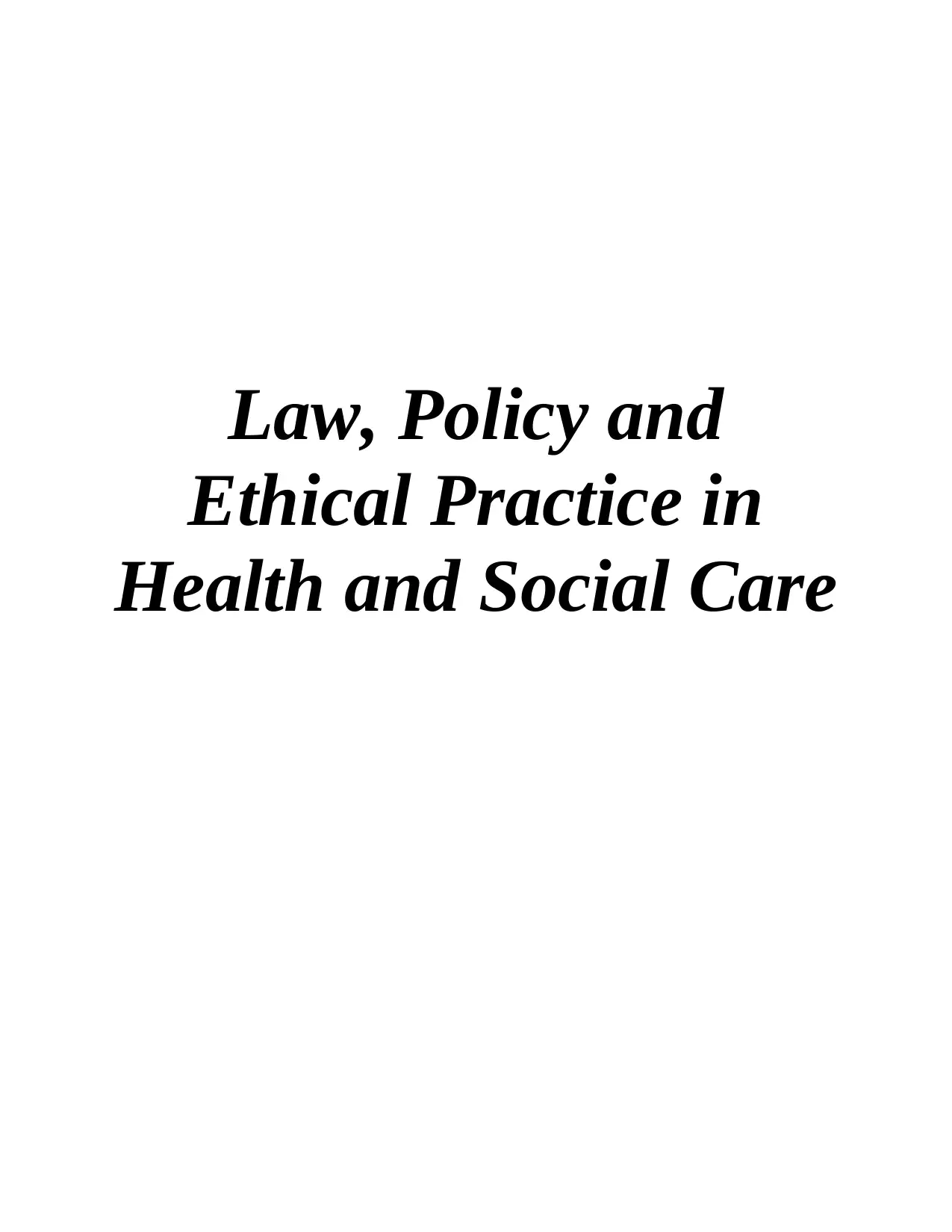
Law, Policy and
Ethical Practice in
Health and Social Care
Ethical Practice in
Health and Social Care
Paraphrase This Document
Need a fresh take? Get an instant paraphrase of this document with our AI Paraphraser
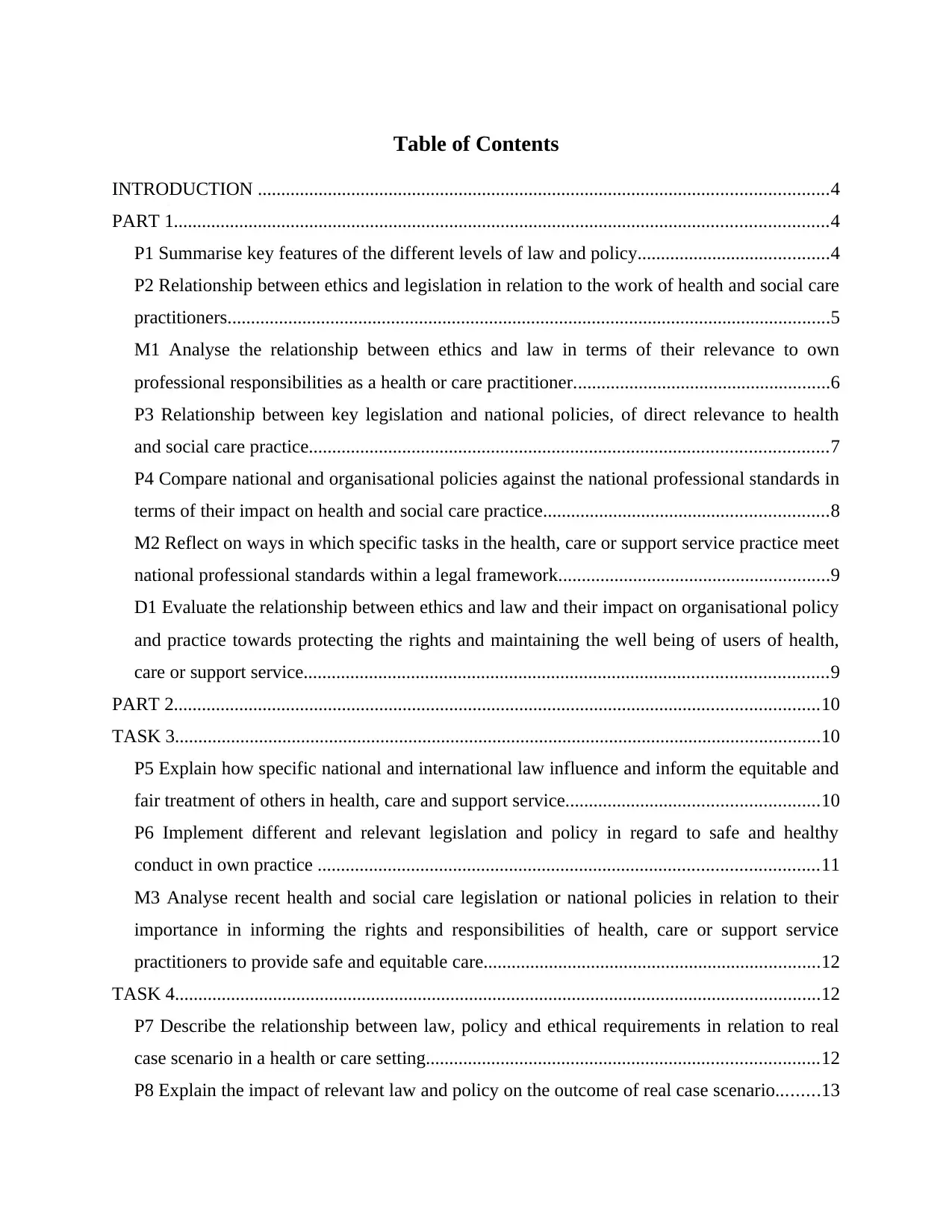
Table of Contents
INTRODUCTION ..........................................................................................................................4
PART 1............................................................................................................................................4
P1 Summarise key features of the different levels of law and policy.........................................4
P2 Relationship between ethics and legislation in relation to the work of health and social care
practitioners.................................................................................................................................5
M1 Analyse the relationship between ethics and law in terms of their relevance to own
professional responsibilities as a health or care practitioner.......................................................6
P3 Relationship between key legislation and national policies, of direct relevance to health
and social care practice...............................................................................................................7
P4 Compare national and organisational policies against the national professional standards in
terms of their impact on health and social care practice.............................................................8
M2 Reflect on ways in which specific tasks in the health, care or support service practice meet
national professional standards within a legal framework..........................................................9
D1 Evaluate the relationship between ethics and law and their impact on organisational policy
and practice towards protecting the rights and maintaining the well being of users of health,
care or support service................................................................................................................9
PART 2..........................................................................................................................................10
TASK 3..........................................................................................................................................10
P5 Explain how specific national and international law influence and inform the equitable and
fair treatment of others in health, care and support service......................................................10
P6 Implement different and relevant legislation and policy in regard to safe and healthy
conduct in own practice ...........................................................................................................11
M3 Analyse recent health and social care legislation or national policies in relation to their
importance in informing the rights and responsibilities of health, care or support service
practitioners to provide safe and equitable care........................................................................12
TASK 4..........................................................................................................................................12
P7 Describe the relationship between law, policy and ethical requirements in relation to real
case scenario in a health or care setting....................................................................................12
P8 Explain the impact of relevant law and policy on the outcome of real case scenario.........13
INTRODUCTION ..........................................................................................................................4
PART 1............................................................................................................................................4
P1 Summarise key features of the different levels of law and policy.........................................4
P2 Relationship between ethics and legislation in relation to the work of health and social care
practitioners.................................................................................................................................5
M1 Analyse the relationship between ethics and law in terms of their relevance to own
professional responsibilities as a health or care practitioner.......................................................6
P3 Relationship between key legislation and national policies, of direct relevance to health
and social care practice...............................................................................................................7
P4 Compare national and organisational policies against the national professional standards in
terms of their impact on health and social care practice.............................................................8
M2 Reflect on ways in which specific tasks in the health, care or support service practice meet
national professional standards within a legal framework..........................................................9
D1 Evaluate the relationship between ethics and law and their impact on organisational policy
and practice towards protecting the rights and maintaining the well being of users of health,
care or support service................................................................................................................9
PART 2..........................................................................................................................................10
TASK 3..........................................................................................................................................10
P5 Explain how specific national and international law influence and inform the equitable and
fair treatment of others in health, care and support service......................................................10
P6 Implement different and relevant legislation and policy in regard to safe and healthy
conduct in own practice ...........................................................................................................11
M3 Analyse recent health and social care legislation or national policies in relation to their
importance in informing the rights and responsibilities of health, care or support service
practitioners to provide safe and equitable care........................................................................12
TASK 4..........................................................................................................................................12
P7 Describe the relationship between law, policy and ethical requirements in relation to real
case scenario in a health or care setting....................................................................................12
P8 Explain the impact of relevant law and policy on the outcome of real case scenario.........13
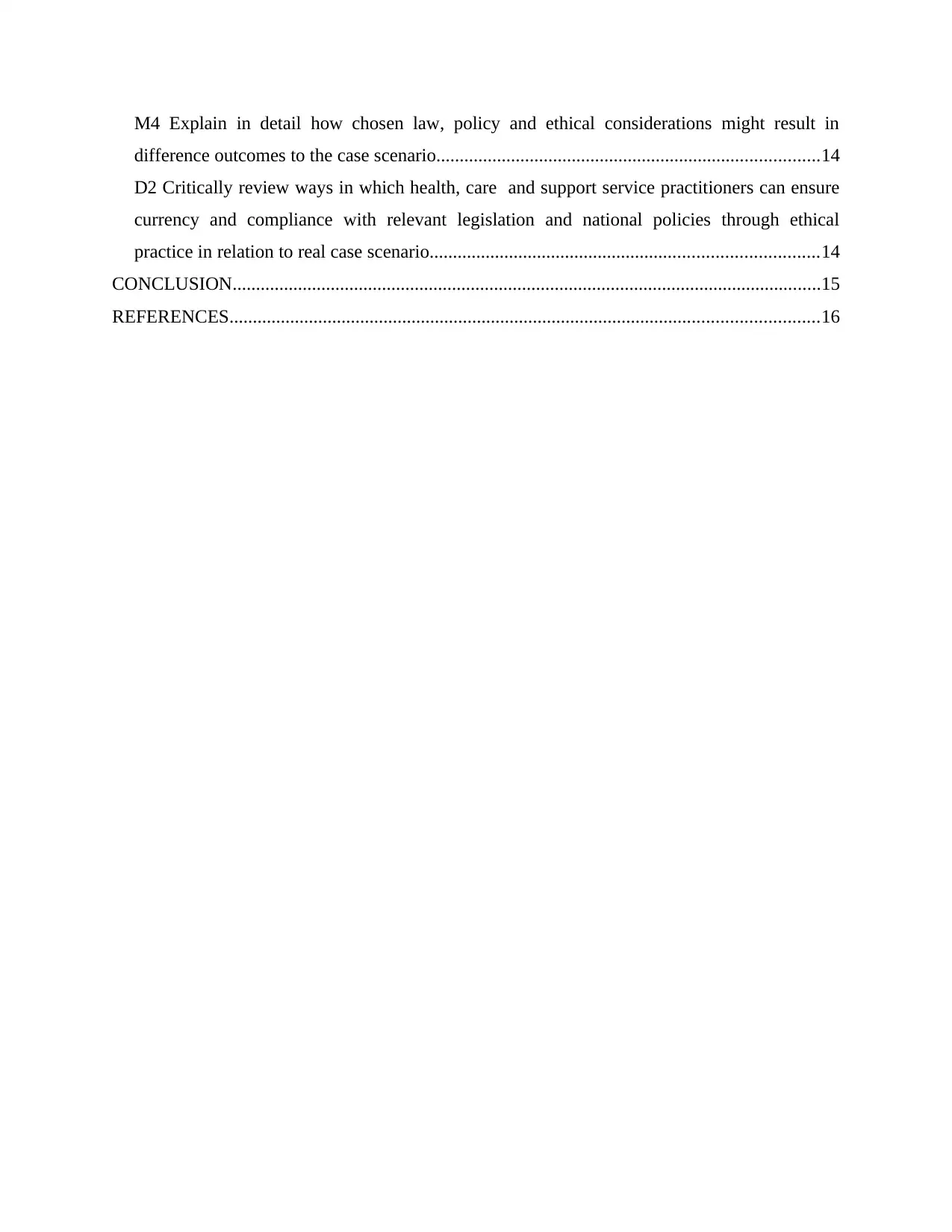
M4 Explain in detail how chosen law, policy and ethical considerations might result in
difference outcomes to the case scenario..................................................................................14
D2 Critically review ways in which health, care and support service practitioners can ensure
currency and compliance with relevant legislation and national policies through ethical
practice in relation to real case scenario...................................................................................14
CONCLUSION..............................................................................................................................15
REFERENCES..............................................................................................................................16
difference outcomes to the case scenario..................................................................................14
D2 Critically review ways in which health, care and support service practitioners can ensure
currency and compliance with relevant legislation and national policies through ethical
practice in relation to real case scenario...................................................................................14
CONCLUSION..............................................................................................................................15
REFERENCES..............................................................................................................................16
⊘ This is a preview!⊘
Do you want full access?
Subscribe today to unlock all pages.

Trusted by 1+ million students worldwide
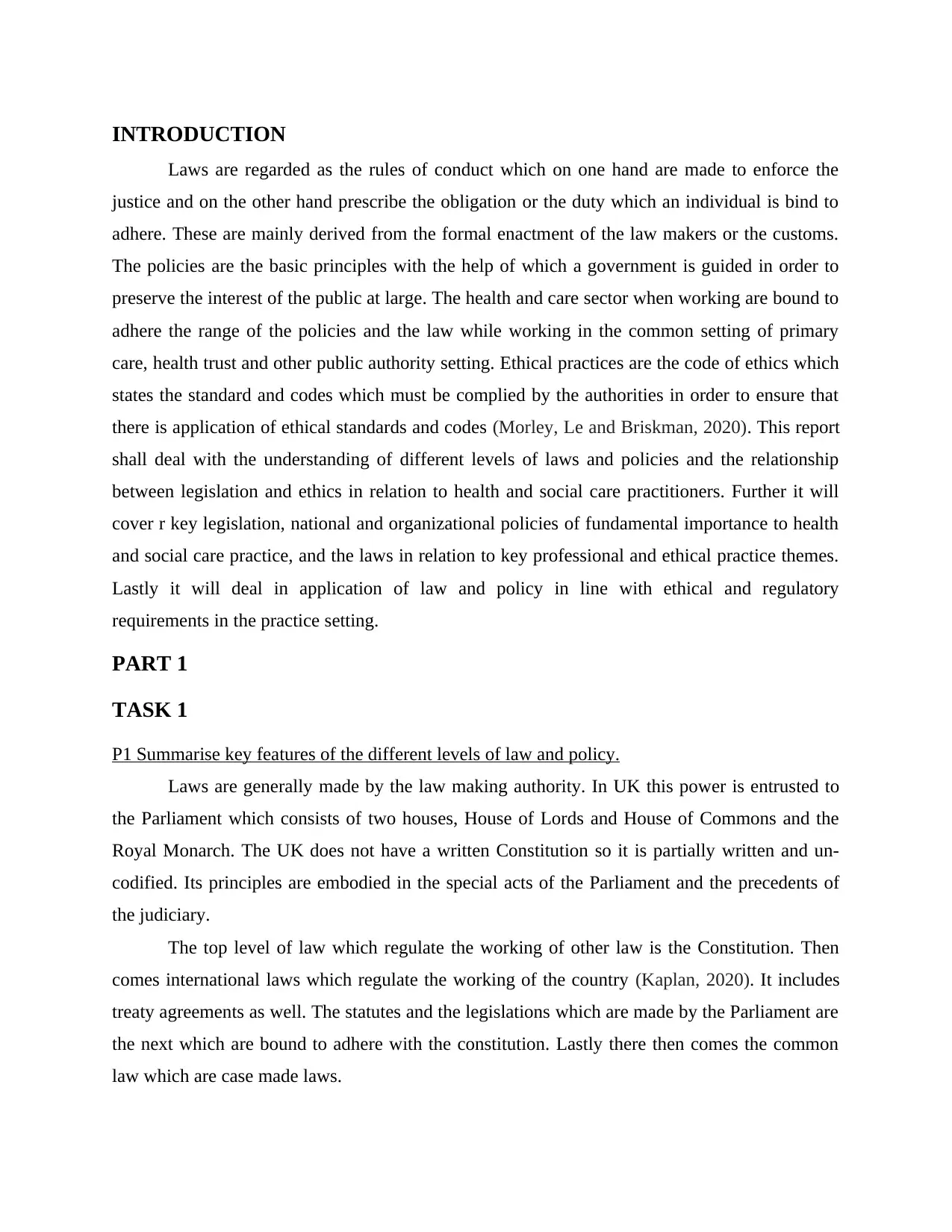
INTRODUCTION
Laws are regarded as the rules of conduct which on one hand are made to enforce the
justice and on the other hand prescribe the obligation or the duty which an individual is bind to
adhere. These are mainly derived from the formal enactment of the law makers or the customs.
The policies are the basic principles with the help of which a government is guided in order to
preserve the interest of the public at large. The health and care sector when working are bound to
adhere the range of the policies and the law while working in the common setting of primary
care, health trust and other public authority setting. Ethical practices are the code of ethics which
states the standard and codes which must be complied by the authorities in order to ensure that
there is application of ethical standards and codes (Morley, Le and Briskman, 2020). This report
shall deal with the understanding of different levels of laws and policies and the relationship
between legislation and ethics in relation to health and social care practitioners. Further it will
cover r key legislation, national and organizational policies of fundamental importance to health
and social care practice, and the laws in relation to key professional and ethical practice themes.
Lastly it will deal in application of law and policy in line with ethical and regulatory
requirements in the practice setting.
PART 1
TASK 1
P1 Summarise key features of the different levels of law and policy.
Laws are generally made by the law making authority. In UK this power is entrusted to
the Parliament which consists of two houses, House of Lords and House of Commons and the
Royal Monarch. The UK does not have a written Constitution so it is partially written and un-
codified. Its principles are embodied in the special acts of the Parliament and the precedents of
the judiciary.
The top level of law which regulate the working of other law is the Constitution. Then
comes international laws which regulate the working of the country (Kaplan, 2020). It includes
treaty agreements as well. The statutes and the legislations which are made by the Parliament are
the next which are bound to adhere with the constitution. Lastly there then comes the common
law which are case made laws.
Laws are regarded as the rules of conduct which on one hand are made to enforce the
justice and on the other hand prescribe the obligation or the duty which an individual is bind to
adhere. These are mainly derived from the formal enactment of the law makers or the customs.
The policies are the basic principles with the help of which a government is guided in order to
preserve the interest of the public at large. The health and care sector when working are bound to
adhere the range of the policies and the law while working in the common setting of primary
care, health trust and other public authority setting. Ethical practices are the code of ethics which
states the standard and codes which must be complied by the authorities in order to ensure that
there is application of ethical standards and codes (Morley, Le and Briskman, 2020). This report
shall deal with the understanding of different levels of laws and policies and the relationship
between legislation and ethics in relation to health and social care practitioners. Further it will
cover r key legislation, national and organizational policies of fundamental importance to health
and social care practice, and the laws in relation to key professional and ethical practice themes.
Lastly it will deal in application of law and policy in line with ethical and regulatory
requirements in the practice setting.
PART 1
TASK 1
P1 Summarise key features of the different levels of law and policy.
Laws are generally made by the law making authority. In UK this power is entrusted to
the Parliament which consists of two houses, House of Lords and House of Commons and the
Royal Monarch. The UK does not have a written Constitution so it is partially written and un-
codified. Its principles are embodied in the special acts of the Parliament and the precedents of
the judiciary.
The top level of law which regulate the working of other law is the Constitution. Then
comes international laws which regulate the working of the country (Kaplan, 2020). It includes
treaty agreements as well. The statutes and the legislations which are made by the Parliament are
the next which are bound to adhere with the constitution. Lastly there then comes the common
law which are case made laws.
Paraphrase This Document
Need a fresh take? Get an instant paraphrase of this document with our AI Paraphraser
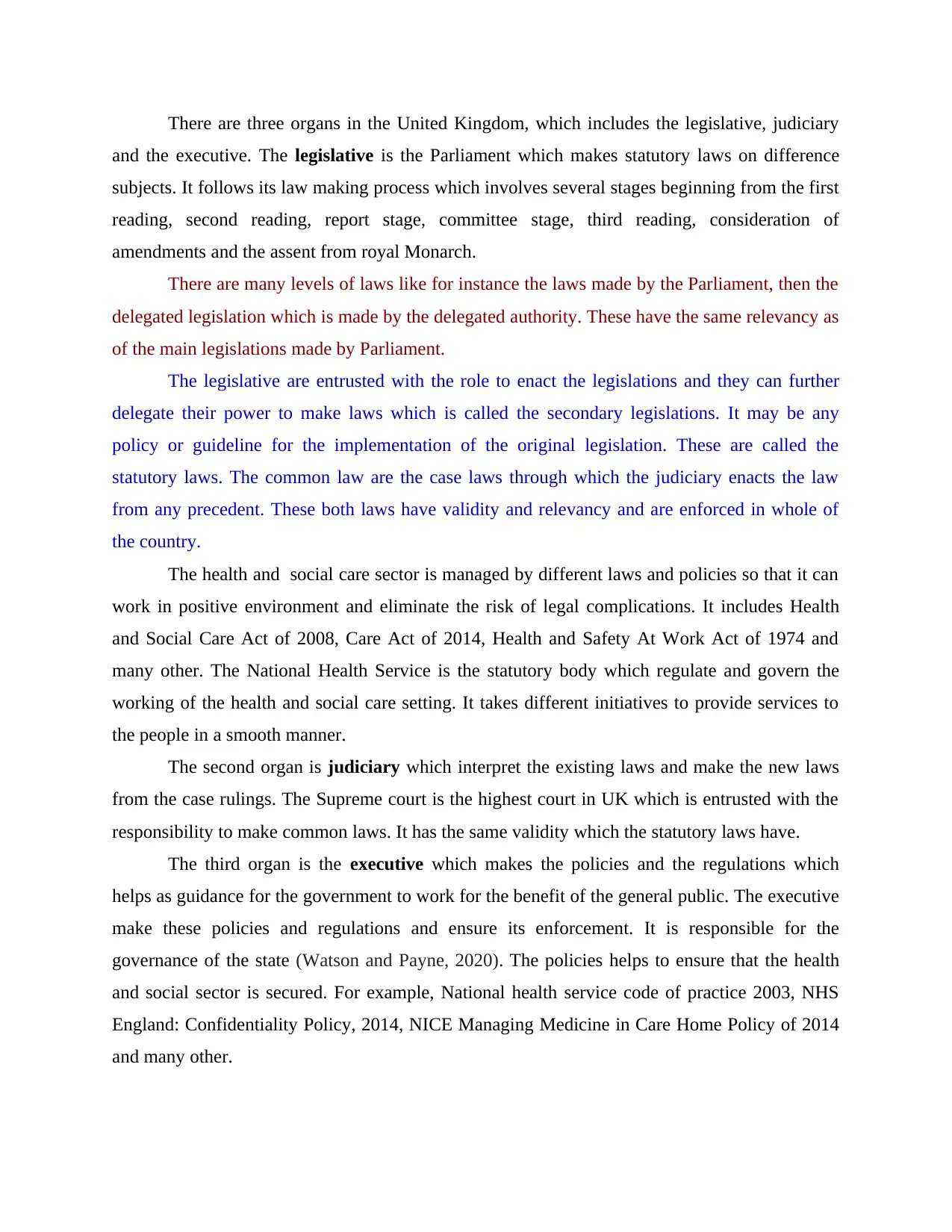
There are three organs in the United Kingdom, which includes the legislative, judiciary
and the executive. The legislative is the Parliament which makes statutory laws on difference
subjects. It follows its law making process which involves several stages beginning from the first
reading, second reading, report stage, committee stage, third reading, consideration of
amendments and the assent from royal Monarch.
There are many levels of laws like for instance the laws made by the Parliament, then the
delegated legislation which is made by the delegated authority. These have the same relevancy as
of the main legislations made by Parliament.
The legislative are entrusted with the role to enact the legislations and they can further
delegate their power to make laws which is called the secondary legislations. It may be any
policy or guideline for the implementation of the original legislation. These are called the
statutory laws. The common law are the case laws through which the judiciary enacts the law
from any precedent. These both laws have validity and relevancy and are enforced in whole of
the country.
The health and social care sector is managed by different laws and policies so that it can
work in positive environment and eliminate the risk of legal complications. It includes Health
and Social Care Act of 2008, Care Act of 2014, Health and Safety At Work Act of 1974 and
many other. The National Health Service is the statutory body which regulate and govern the
working of the health and social care setting. It takes different initiatives to provide services to
the people in a smooth manner.
The second organ is judiciary which interpret the existing laws and make the new laws
from the case rulings. The Supreme court is the highest court in UK which is entrusted with the
responsibility to make common laws. It has the same validity which the statutory laws have.
The third organ is the executive which makes the policies and the regulations which
helps as guidance for the government to work for the benefit of the general public. The executive
make these policies and regulations and ensure its enforcement. It is responsible for the
governance of the state (Watson and Payne, 2020). The policies helps to ensure that the health
and social sector is secured. For example, National health service code of practice 2003, NHS
England: Confidentiality Policy, 2014, NICE Managing Medicine in Care Home Policy of 2014
and many other.
and the executive. The legislative is the Parliament which makes statutory laws on difference
subjects. It follows its law making process which involves several stages beginning from the first
reading, second reading, report stage, committee stage, third reading, consideration of
amendments and the assent from royal Monarch.
There are many levels of laws like for instance the laws made by the Parliament, then the
delegated legislation which is made by the delegated authority. These have the same relevancy as
of the main legislations made by Parliament.
The legislative are entrusted with the role to enact the legislations and they can further
delegate their power to make laws which is called the secondary legislations. It may be any
policy or guideline for the implementation of the original legislation. These are called the
statutory laws. The common law are the case laws through which the judiciary enacts the law
from any precedent. These both laws have validity and relevancy and are enforced in whole of
the country.
The health and social care sector is managed by different laws and policies so that it can
work in positive environment and eliminate the risk of legal complications. It includes Health
and Social Care Act of 2008, Care Act of 2014, Health and Safety At Work Act of 1974 and
many other. The National Health Service is the statutory body which regulate and govern the
working of the health and social care setting. It takes different initiatives to provide services to
the people in a smooth manner.
The second organ is judiciary which interpret the existing laws and make the new laws
from the case rulings. The Supreme court is the highest court in UK which is entrusted with the
responsibility to make common laws. It has the same validity which the statutory laws have.
The third organ is the executive which makes the policies and the regulations which
helps as guidance for the government to work for the benefit of the general public. The executive
make these policies and regulations and ensure its enforcement. It is responsible for the
governance of the state (Watson and Payne, 2020). The policies helps to ensure that the health
and social sector is secured. For example, National health service code of practice 2003, NHS
England: Confidentiality Policy, 2014, NICE Managing Medicine in Care Home Policy of 2014
and many other.
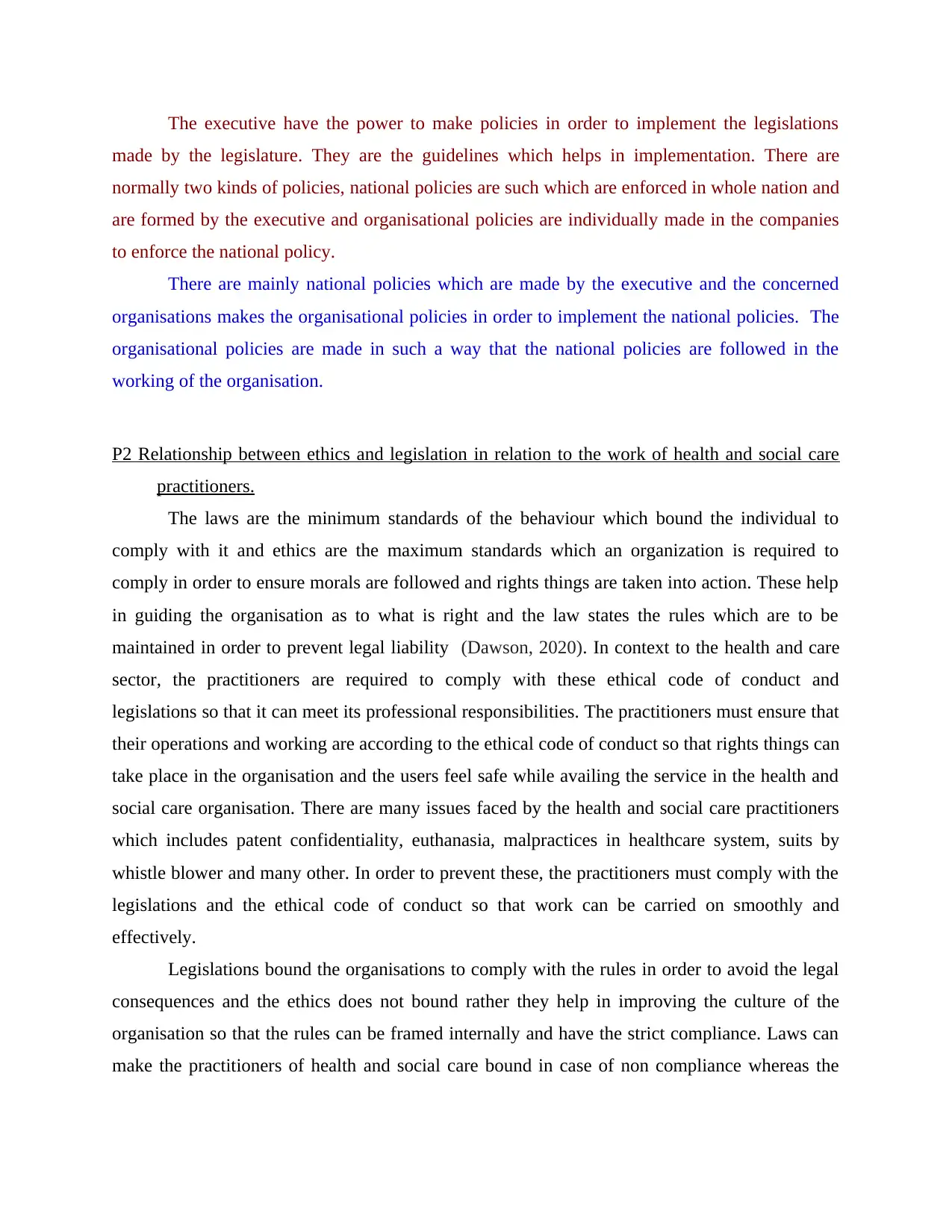
The executive have the power to make policies in order to implement the legislations
made by the legislature. They are the guidelines which helps in implementation. There are
normally two kinds of policies, national policies are such which are enforced in whole nation and
are formed by the executive and organisational policies are individually made in the companies
to enforce the national policy.
There are mainly national policies which are made by the executive and the concerned
organisations makes the organisational policies in order to implement the national policies. The
organisational policies are made in such a way that the national policies are followed in the
working of the organisation.
P2 Relationship between ethics and legislation in relation to the work of health and social care
practitioners.
The laws are the minimum standards of the behaviour which bound the individual to
comply with it and ethics are the maximum standards which an organization is required to
comply in order to ensure morals are followed and rights things are taken into action. These help
in guiding the organisation as to what is right and the law states the rules which are to be
maintained in order to prevent legal liability (Dawson, 2020). In context to the health and care
sector, the practitioners are required to comply with these ethical code of conduct and
legislations so that it can meet its professional responsibilities. The practitioners must ensure that
their operations and working are according to the ethical code of conduct so that rights things can
take place in the organisation and the users feel safe while availing the service in the health and
social care organisation. There are many issues faced by the health and social care practitioners
which includes patent confidentiality, euthanasia, malpractices in healthcare system, suits by
whistle blower and many other. In order to prevent these, the practitioners must comply with the
legislations and the ethical code of conduct so that work can be carried on smoothly and
effectively.
Legislations bound the organisations to comply with the rules in order to avoid the legal
consequences and the ethics does not bound rather they help in improving the culture of the
organisation so that the rules can be framed internally and have the strict compliance. Laws can
make the practitioners of health and social care bound in case of non compliance whereas the
made by the legislature. They are the guidelines which helps in implementation. There are
normally two kinds of policies, national policies are such which are enforced in whole nation and
are formed by the executive and organisational policies are individually made in the companies
to enforce the national policy.
There are mainly national policies which are made by the executive and the concerned
organisations makes the organisational policies in order to implement the national policies. The
organisational policies are made in such a way that the national policies are followed in the
working of the organisation.
P2 Relationship between ethics and legislation in relation to the work of health and social care
practitioners.
The laws are the minimum standards of the behaviour which bound the individual to
comply with it and ethics are the maximum standards which an organization is required to
comply in order to ensure morals are followed and rights things are taken into action. These help
in guiding the organisation as to what is right and the law states the rules which are to be
maintained in order to prevent legal liability (Dawson, 2020). In context to the health and care
sector, the practitioners are required to comply with these ethical code of conduct and
legislations so that it can meet its professional responsibilities. The practitioners must ensure that
their operations and working are according to the ethical code of conduct so that rights things can
take place in the organisation and the users feel safe while availing the service in the health and
social care organisation. There are many issues faced by the health and social care practitioners
which includes patent confidentiality, euthanasia, malpractices in healthcare system, suits by
whistle blower and many other. In order to prevent these, the practitioners must comply with the
legislations and the ethical code of conduct so that work can be carried on smoothly and
effectively.
Legislations bound the organisations to comply with the rules in order to avoid the legal
consequences and the ethics does not bound rather they help in improving the culture of the
organisation so that the rules can be framed internally and have the strict compliance. Laws can
make the practitioners of health and social care bound in case of non compliance whereas the
⊘ This is a preview!⊘
Do you want full access?
Subscribe today to unlock all pages.

Trusted by 1+ million students worldwide
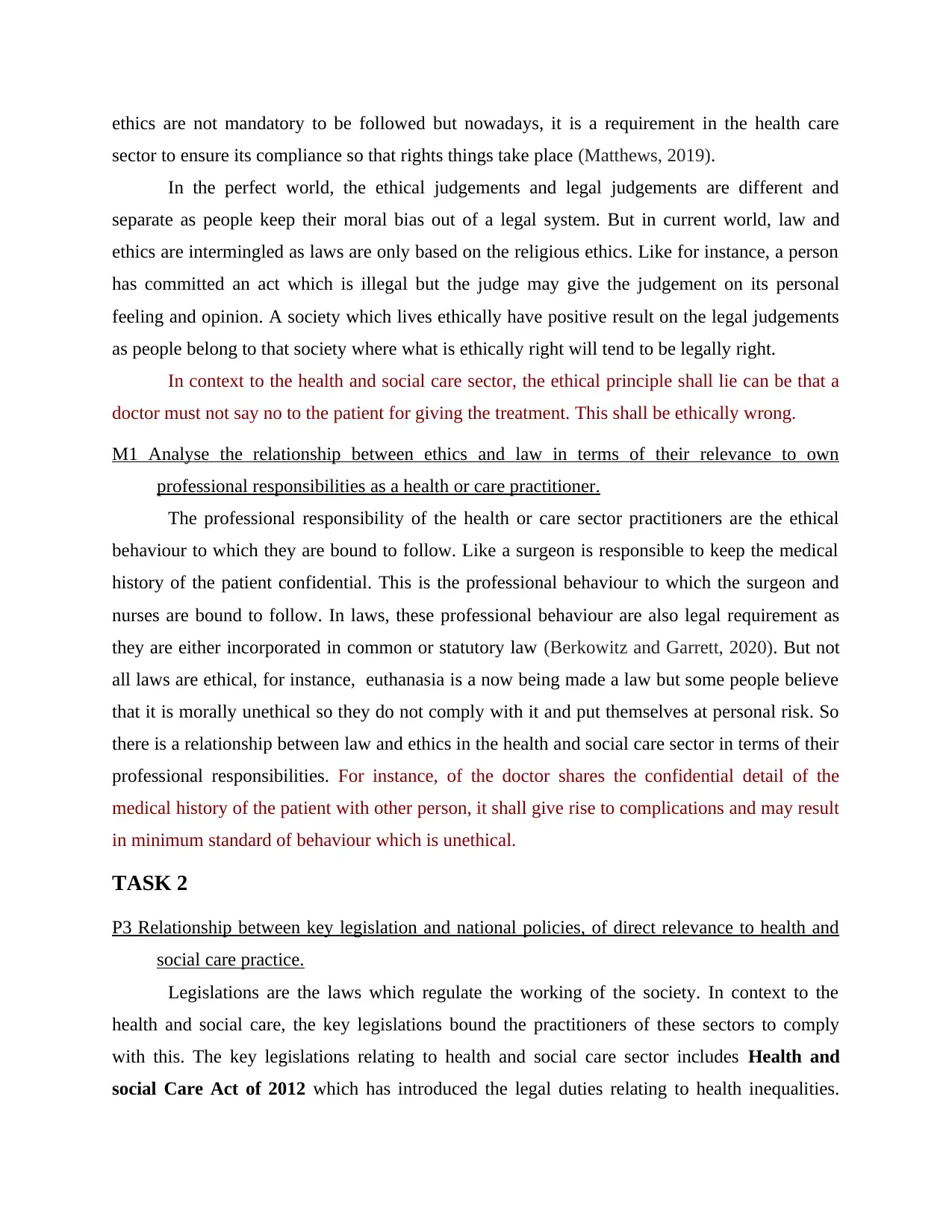
ethics are not mandatory to be followed but nowadays, it is a requirement in the health care
sector to ensure its compliance so that rights things take place (Matthews, 2019).
In the perfect world, the ethical judgements and legal judgements are different and
separate as people keep their moral bias out of a legal system. But in current world, law and
ethics are intermingled as laws are only based on the religious ethics. Like for instance, a person
has committed an act which is illegal but the judge may give the judgement on its personal
feeling and opinion. A society which lives ethically have positive result on the legal judgements
as people belong to that society where what is ethically right will tend to be legally right.
In context to the health and social care sector, the ethical principle shall lie can be that a
doctor must not say no to the patient for giving the treatment. This shall be ethically wrong.
M1 Analyse the relationship between ethics and law in terms of their relevance to own
professional responsibilities as a health or care practitioner.
The professional responsibility of the health or care sector practitioners are the ethical
behaviour to which they are bound to follow. Like a surgeon is responsible to keep the medical
history of the patient confidential. This is the professional behaviour to which the surgeon and
nurses are bound to follow. In laws, these professional behaviour are also legal requirement as
they are either incorporated in common or statutory law (Berkowitz and Garrett, 2020). But not
all laws are ethical, for instance, euthanasia is a now being made a law but some people believe
that it is morally unethical so they do not comply with it and put themselves at personal risk. So
there is a relationship between law and ethics in the health and social care sector in terms of their
professional responsibilities. For instance, of the doctor shares the confidential detail of the
medical history of the patient with other person, it shall give rise to complications and may result
in minimum standard of behaviour which is unethical.
TASK 2
P3 Relationship between key legislation and national policies, of direct relevance to health and
social care practice.
Legislations are the laws which regulate the working of the society. In context to the
health and social care, the key legislations bound the practitioners of these sectors to comply
with this. The key legislations relating to health and social care sector includes Health and
social Care Act of 2012 which has introduced the legal duties relating to health inequalities.
sector to ensure its compliance so that rights things take place (Matthews, 2019).
In the perfect world, the ethical judgements and legal judgements are different and
separate as people keep their moral bias out of a legal system. But in current world, law and
ethics are intermingled as laws are only based on the religious ethics. Like for instance, a person
has committed an act which is illegal but the judge may give the judgement on its personal
feeling and opinion. A society which lives ethically have positive result on the legal judgements
as people belong to that society where what is ethically right will tend to be legally right.
In context to the health and social care sector, the ethical principle shall lie can be that a
doctor must not say no to the patient for giving the treatment. This shall be ethically wrong.
M1 Analyse the relationship between ethics and law in terms of their relevance to own
professional responsibilities as a health or care practitioner.
The professional responsibility of the health or care sector practitioners are the ethical
behaviour to which they are bound to follow. Like a surgeon is responsible to keep the medical
history of the patient confidential. This is the professional behaviour to which the surgeon and
nurses are bound to follow. In laws, these professional behaviour are also legal requirement as
they are either incorporated in common or statutory law (Berkowitz and Garrett, 2020). But not
all laws are ethical, for instance, euthanasia is a now being made a law but some people believe
that it is morally unethical so they do not comply with it and put themselves at personal risk. So
there is a relationship between law and ethics in the health and social care sector in terms of their
professional responsibilities. For instance, of the doctor shares the confidential detail of the
medical history of the patient with other person, it shall give rise to complications and may result
in minimum standard of behaviour which is unethical.
TASK 2
P3 Relationship between key legislation and national policies, of direct relevance to health and
social care practice.
Legislations are the laws which regulate the working of the society. In context to the
health and social care, the key legislations bound the practitioners of these sectors to comply
with this. The key legislations relating to health and social care sector includes Health and
social Care Act of 2012 which has introduced the legal duties relating to health inequalities.
Paraphrase This Document
Need a fresh take? Get an instant paraphrase of this document with our AI Paraphraser
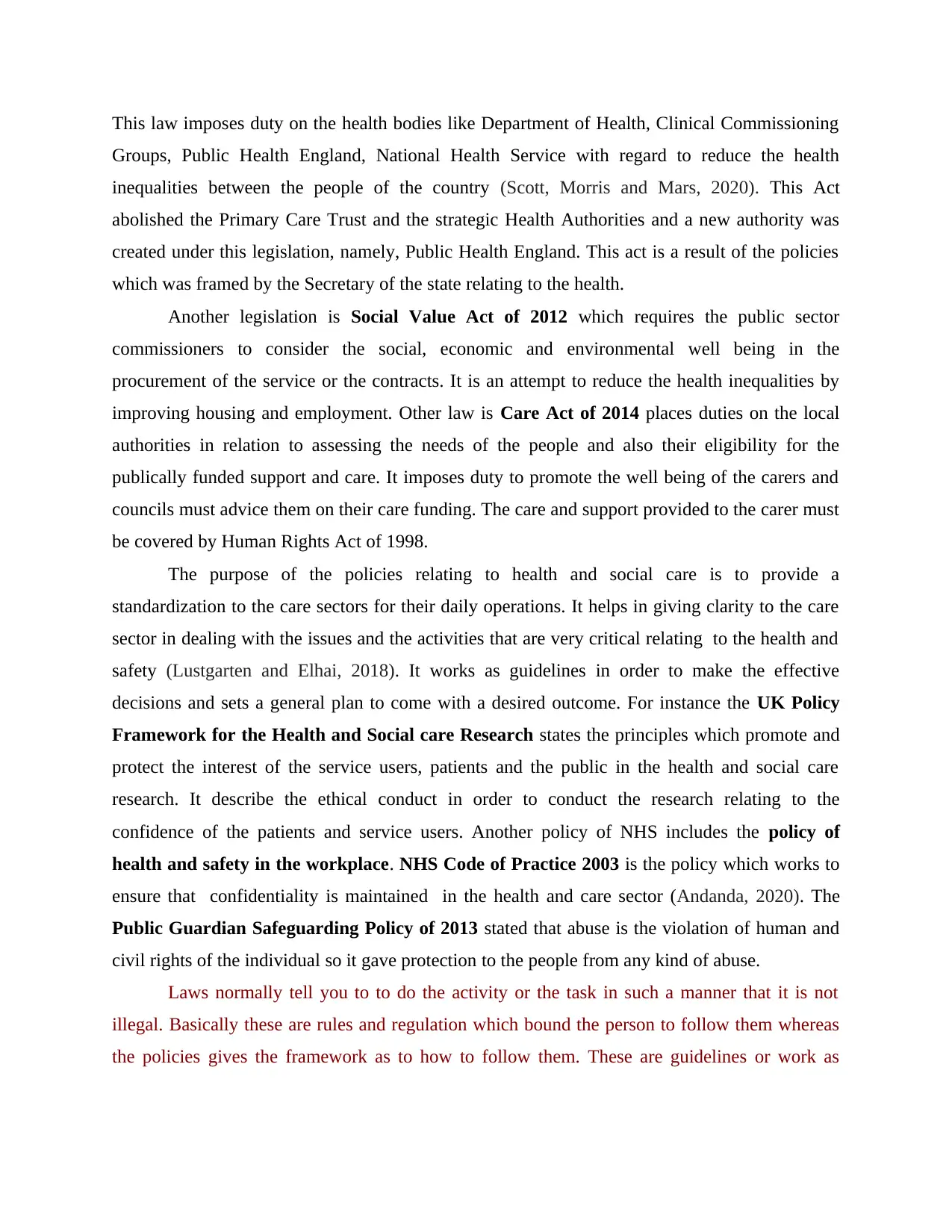
This law imposes duty on the health bodies like Department of Health, Clinical Commissioning
Groups, Public Health England, National Health Service with regard to reduce the health
inequalities between the people of the country (Scott, Morris and Mars, 2020). This Act
abolished the Primary Care Trust and the strategic Health Authorities and a new authority was
created under this legislation, namely, Public Health England. This act is a result of the policies
which was framed by the Secretary of the state relating to the health.
Another legislation is Social Value Act of 2012 which requires the public sector
commissioners to consider the social, economic and environmental well being in the
procurement of the service or the contracts. It is an attempt to reduce the health inequalities by
improving housing and employment. Other law is Care Act of 2014 places duties on the local
authorities in relation to assessing the needs of the people and also their eligibility for the
publically funded support and care. It imposes duty to promote the well being of the carers and
councils must advice them on their care funding. The care and support provided to the carer must
be covered by Human Rights Act of 1998.
The purpose of the policies relating to health and social care is to provide a
standardization to the care sectors for their daily operations. It helps in giving clarity to the care
sector in dealing with the issues and the activities that are very critical relating to the health and
safety (Lustgarten and Elhai, 2018). It works as guidelines in order to make the effective
decisions and sets a general plan to come with a desired outcome. For instance the UK Policy
Framework for the Health and Social care Research states the principles which promote and
protect the interest of the service users, patients and the public in the health and social care
research. It describe the ethical conduct in order to conduct the research relating to the
confidence of the patients and service users. Another policy of NHS includes the policy of
health and safety in the workplace. NHS Code of Practice 2003 is the policy which works to
ensure that confidentiality is maintained in the health and care sector (Andanda, 2020). The
Public Guardian Safeguarding Policy of 2013 stated that abuse is the violation of human and
civil rights of the individual so it gave protection to the people from any kind of abuse.
Laws normally tell you to to do the activity or the task in such a manner that it is not
illegal. Basically these are rules and regulation which bound the person to follow them whereas
the policies gives the framework as to how to follow them. These are guidelines or work as
Groups, Public Health England, National Health Service with regard to reduce the health
inequalities between the people of the country (Scott, Morris and Mars, 2020). This Act
abolished the Primary Care Trust and the strategic Health Authorities and a new authority was
created under this legislation, namely, Public Health England. This act is a result of the policies
which was framed by the Secretary of the state relating to the health.
Another legislation is Social Value Act of 2012 which requires the public sector
commissioners to consider the social, economic and environmental well being in the
procurement of the service or the contracts. It is an attempt to reduce the health inequalities by
improving housing and employment. Other law is Care Act of 2014 places duties on the local
authorities in relation to assessing the needs of the people and also their eligibility for the
publically funded support and care. It imposes duty to promote the well being of the carers and
councils must advice them on their care funding. The care and support provided to the carer must
be covered by Human Rights Act of 1998.
The purpose of the policies relating to health and social care is to provide a
standardization to the care sectors for their daily operations. It helps in giving clarity to the care
sector in dealing with the issues and the activities that are very critical relating to the health and
safety (Lustgarten and Elhai, 2018). It works as guidelines in order to make the effective
decisions and sets a general plan to come with a desired outcome. For instance the UK Policy
Framework for the Health and Social care Research states the principles which promote and
protect the interest of the service users, patients and the public in the health and social care
research. It describe the ethical conduct in order to conduct the research relating to the
confidence of the patients and service users. Another policy of NHS includes the policy of
health and safety in the workplace. NHS Code of Practice 2003 is the policy which works to
ensure that confidentiality is maintained in the health and care sector (Andanda, 2020). The
Public Guardian Safeguarding Policy of 2013 stated that abuse is the violation of human and
civil rights of the individual so it gave protection to the people from any kind of abuse.
Laws normally tell you to to do the activity or the task in such a manner that it is not
illegal. Basically these are rules and regulation which bound the person to follow them whereas
the policies gives the framework as to how to follow them. These are guidelines or work as
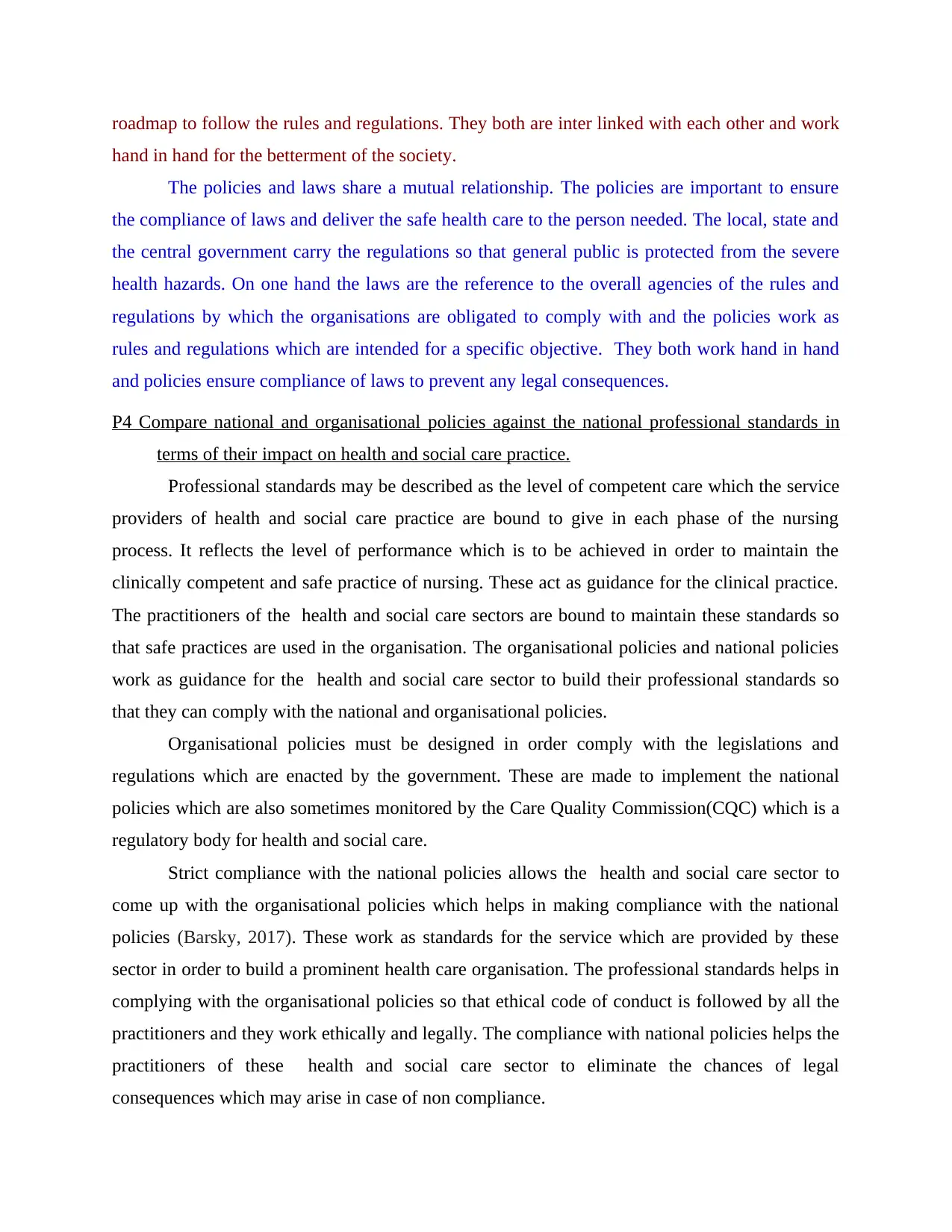
roadmap to follow the rules and regulations. They both are inter linked with each other and work
hand in hand for the betterment of the society.
The policies and laws share a mutual relationship. The policies are important to ensure
the compliance of laws and deliver the safe health care to the person needed. The local, state and
the central government carry the regulations so that general public is protected from the severe
health hazards. On one hand the laws are the reference to the overall agencies of the rules and
regulations by which the organisations are obligated to comply with and the policies work as
rules and regulations which are intended for a specific objective. They both work hand in hand
and policies ensure compliance of laws to prevent any legal consequences.
P4 Compare national and organisational policies against the national professional standards in
terms of their impact on health and social care practice.
Professional standards may be described as the level of competent care which the service
providers of health and social care practice are bound to give in each phase of the nursing
process. It reflects the level of performance which is to be achieved in order to maintain the
clinically competent and safe practice of nursing. These act as guidance for the clinical practice.
The practitioners of the health and social care sectors are bound to maintain these standards so
that safe practices are used in the organisation. The organisational policies and national policies
work as guidance for the health and social care sector to build their professional standards so
that they can comply with the national and organisational policies.
Organisational policies must be designed in order comply with the legislations and
regulations which are enacted by the government. These are made to implement the national
policies which are also sometimes monitored by the Care Quality Commission(CQC) which is a
regulatory body for health and social care.
Strict compliance with the national policies allows the health and social care sector to
come up with the organisational policies which helps in making compliance with the national
policies (Barsky, 2017). These work as standards for the service which are provided by these
sector in order to build a prominent health care organisation. The professional standards helps in
complying with the organisational policies so that ethical code of conduct is followed by all the
practitioners and they work ethically and legally. The compliance with national policies helps the
practitioners of these health and social care sector to eliminate the chances of legal
consequences which may arise in case of non compliance.
hand in hand for the betterment of the society.
The policies and laws share a mutual relationship. The policies are important to ensure
the compliance of laws and deliver the safe health care to the person needed. The local, state and
the central government carry the regulations so that general public is protected from the severe
health hazards. On one hand the laws are the reference to the overall agencies of the rules and
regulations by which the organisations are obligated to comply with and the policies work as
rules and regulations which are intended for a specific objective. They both work hand in hand
and policies ensure compliance of laws to prevent any legal consequences.
P4 Compare national and organisational policies against the national professional standards in
terms of their impact on health and social care practice.
Professional standards may be described as the level of competent care which the service
providers of health and social care practice are bound to give in each phase of the nursing
process. It reflects the level of performance which is to be achieved in order to maintain the
clinically competent and safe practice of nursing. These act as guidance for the clinical practice.
The practitioners of the health and social care sectors are bound to maintain these standards so
that safe practices are used in the organisation. The organisational policies and national policies
work as guidance for the health and social care sector to build their professional standards so
that they can comply with the national and organisational policies.
Organisational policies must be designed in order comply with the legislations and
regulations which are enacted by the government. These are made to implement the national
policies which are also sometimes monitored by the Care Quality Commission(CQC) which is a
regulatory body for health and social care.
Strict compliance with the national policies allows the health and social care sector to
come up with the organisational policies which helps in making compliance with the national
policies (Barsky, 2017). These work as standards for the service which are provided by these
sector in order to build a prominent health care organisation. The professional standards helps in
complying with the organisational policies so that ethical code of conduct is followed by all the
practitioners and they work ethically and legally. The compliance with national policies helps the
practitioners of these health and social care sector to eliminate the chances of legal
consequences which may arise in case of non compliance.
⊘ This is a preview!⊘
Do you want full access?
Subscribe today to unlock all pages.

Trusted by 1+ million students worldwide
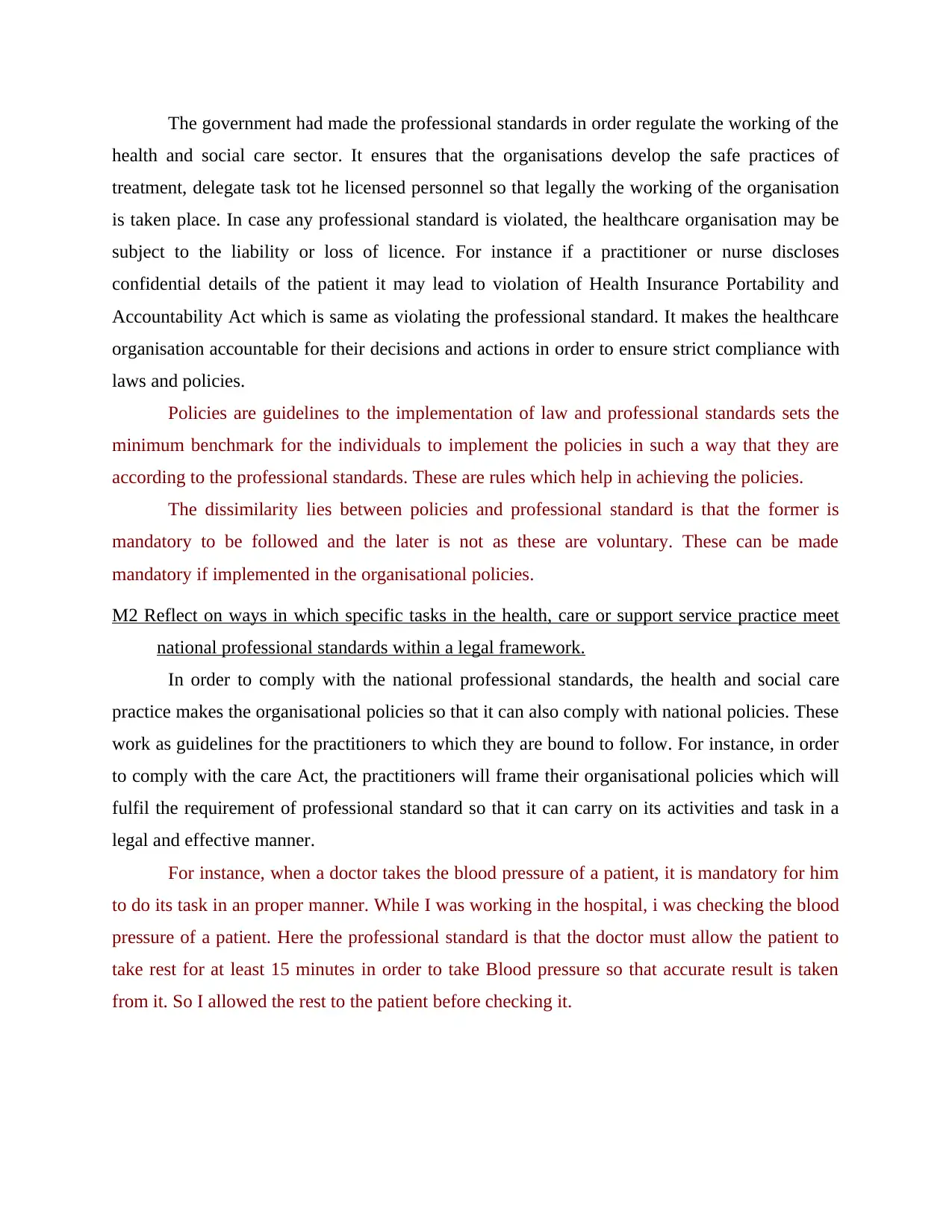
The government had made the professional standards in order regulate the working of the
health and social care sector. It ensures that the organisations develop the safe practices of
treatment, delegate task tot he licensed personnel so that legally the working of the organisation
is taken place. In case any professional standard is violated, the healthcare organisation may be
subject to the liability or loss of licence. For instance if a practitioner or nurse discloses
confidential details of the patient it may lead to violation of Health Insurance Portability and
Accountability Act which is same as violating the professional standard. It makes the healthcare
organisation accountable for their decisions and actions in order to ensure strict compliance with
laws and policies.
Policies are guidelines to the implementation of law and professional standards sets the
minimum benchmark for the individuals to implement the policies in such a way that they are
according to the professional standards. These are rules which help in achieving the policies.
The dissimilarity lies between policies and professional standard is that the former is
mandatory to be followed and the later is not as these are voluntary. These can be made
mandatory if implemented in the organisational policies.
M2 Reflect on ways in which specific tasks in the health, care or support service practice meet
national professional standards within a legal framework.
In order to comply with the national professional standards, the health and social care
practice makes the organisational policies so that it can also comply with national policies. These
work as guidelines for the practitioners to which they are bound to follow. For instance, in order
to comply with the care Act, the practitioners will frame their organisational policies which will
fulfil the requirement of professional standard so that it can carry on its activities and task in a
legal and effective manner.
For instance, when a doctor takes the blood pressure of a patient, it is mandatory for him
to do its task in an proper manner. While I was working in the hospital, i was checking the blood
pressure of a patient. Here the professional standard is that the doctor must allow the patient to
take rest for at least 15 minutes in order to take Blood pressure so that accurate result is taken
from it. So I allowed the rest to the patient before checking it.
health and social care sector. It ensures that the organisations develop the safe practices of
treatment, delegate task tot he licensed personnel so that legally the working of the organisation
is taken place. In case any professional standard is violated, the healthcare organisation may be
subject to the liability or loss of licence. For instance if a practitioner or nurse discloses
confidential details of the patient it may lead to violation of Health Insurance Portability and
Accountability Act which is same as violating the professional standard. It makes the healthcare
organisation accountable for their decisions and actions in order to ensure strict compliance with
laws and policies.
Policies are guidelines to the implementation of law and professional standards sets the
minimum benchmark for the individuals to implement the policies in such a way that they are
according to the professional standards. These are rules which help in achieving the policies.
The dissimilarity lies between policies and professional standard is that the former is
mandatory to be followed and the later is not as these are voluntary. These can be made
mandatory if implemented in the organisational policies.
M2 Reflect on ways in which specific tasks in the health, care or support service practice meet
national professional standards within a legal framework.
In order to comply with the national professional standards, the health and social care
practice makes the organisational policies so that it can also comply with national policies. These
work as guidelines for the practitioners to which they are bound to follow. For instance, in order
to comply with the care Act, the practitioners will frame their organisational policies which will
fulfil the requirement of professional standard so that it can carry on its activities and task in a
legal and effective manner.
For instance, when a doctor takes the blood pressure of a patient, it is mandatory for him
to do its task in an proper manner. While I was working in the hospital, i was checking the blood
pressure of a patient. Here the professional standard is that the doctor must allow the patient to
take rest for at least 15 minutes in order to take Blood pressure so that accurate result is taken
from it. So I allowed the rest to the patient before checking it.
Paraphrase This Document
Need a fresh take? Get an instant paraphrase of this document with our AI Paraphraser
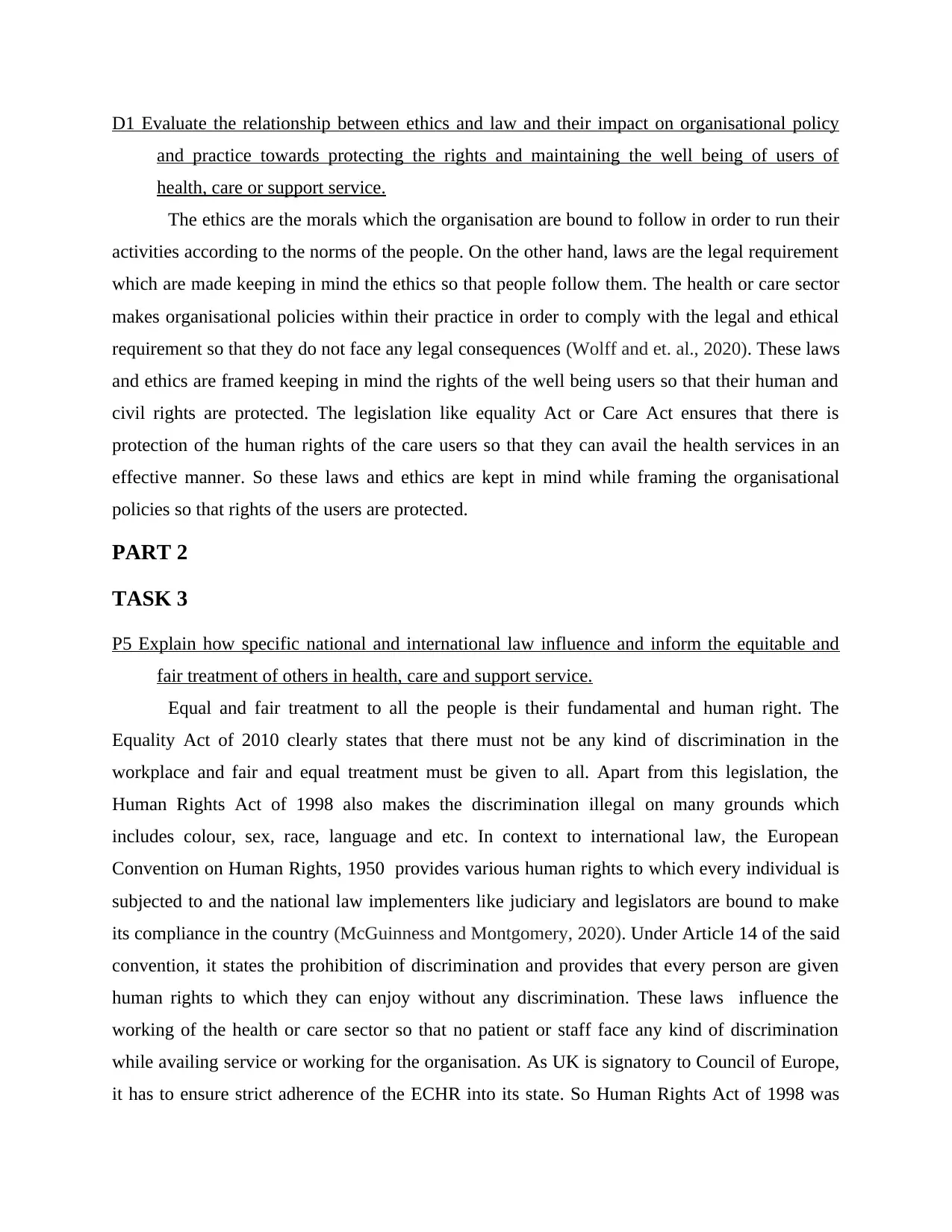
D1 Evaluate the relationship between ethics and law and their impact on organisational policy
and practice towards protecting the rights and maintaining the well being of users of
health, care or support service.
The ethics are the morals which the organisation are bound to follow in order to run their
activities according to the norms of the people. On the other hand, laws are the legal requirement
which are made keeping in mind the ethics so that people follow them. The health or care sector
makes organisational policies within their practice in order to comply with the legal and ethical
requirement so that they do not face any legal consequences (Wolff and et. al., 2020). These laws
and ethics are framed keeping in mind the rights of the well being users so that their human and
civil rights are protected. The legislation like equality Act or Care Act ensures that there is
protection of the human rights of the care users so that they can avail the health services in an
effective manner. So these laws and ethics are kept in mind while framing the organisational
policies so that rights of the users are protected.
PART 2
TASK 3
P5 Explain how specific national and international law influence and inform the equitable and
fair treatment of others in health, care and support service.
Equal and fair treatment to all the people is their fundamental and human right. The
Equality Act of 2010 clearly states that there must not be any kind of discrimination in the
workplace and fair and equal treatment must be given to all. Apart from this legislation, the
Human Rights Act of 1998 also makes the discrimination illegal on many grounds which
includes colour, sex, race, language and etc. In context to international law, the European
Convention on Human Rights, 1950 provides various human rights to which every individual is
subjected to and the national law implementers like judiciary and legislators are bound to make
its compliance in the country (McGuinness and Montgomery, 2020). Under Article 14 of the said
convention, it states the prohibition of discrimination and provides that every person are given
human rights to which they can enjoy without any discrimination. These laws influence the
working of the health or care sector so that no patient or staff face any kind of discrimination
while availing service or working for the organisation. As UK is signatory to Council of Europe,
it has to ensure strict adherence of the ECHR into its state. So Human Rights Act of 1998 was
and practice towards protecting the rights and maintaining the well being of users of
health, care or support service.
The ethics are the morals which the organisation are bound to follow in order to run their
activities according to the norms of the people. On the other hand, laws are the legal requirement
which are made keeping in mind the ethics so that people follow them. The health or care sector
makes organisational policies within their practice in order to comply with the legal and ethical
requirement so that they do not face any legal consequences (Wolff and et. al., 2020). These laws
and ethics are framed keeping in mind the rights of the well being users so that their human and
civil rights are protected. The legislation like equality Act or Care Act ensures that there is
protection of the human rights of the care users so that they can avail the health services in an
effective manner. So these laws and ethics are kept in mind while framing the organisational
policies so that rights of the users are protected.
PART 2
TASK 3
P5 Explain how specific national and international law influence and inform the equitable and
fair treatment of others in health, care and support service.
Equal and fair treatment to all the people is their fundamental and human right. The
Equality Act of 2010 clearly states that there must not be any kind of discrimination in the
workplace and fair and equal treatment must be given to all. Apart from this legislation, the
Human Rights Act of 1998 also makes the discrimination illegal on many grounds which
includes colour, sex, race, language and etc. In context to international law, the European
Convention on Human Rights, 1950 provides various human rights to which every individual is
subjected to and the national law implementers like judiciary and legislators are bound to make
its compliance in the country (McGuinness and Montgomery, 2020). Under Article 14 of the said
convention, it states the prohibition of discrimination and provides that every person are given
human rights to which they can enjoy without any discrimination. These laws influence the
working of the health or care sector so that no patient or staff face any kind of discrimination
while availing service or working for the organisation. As UK is signatory to Council of Europe,
it has to ensure strict adherence of the ECHR into its state. So Human Rights Act of 1998 was
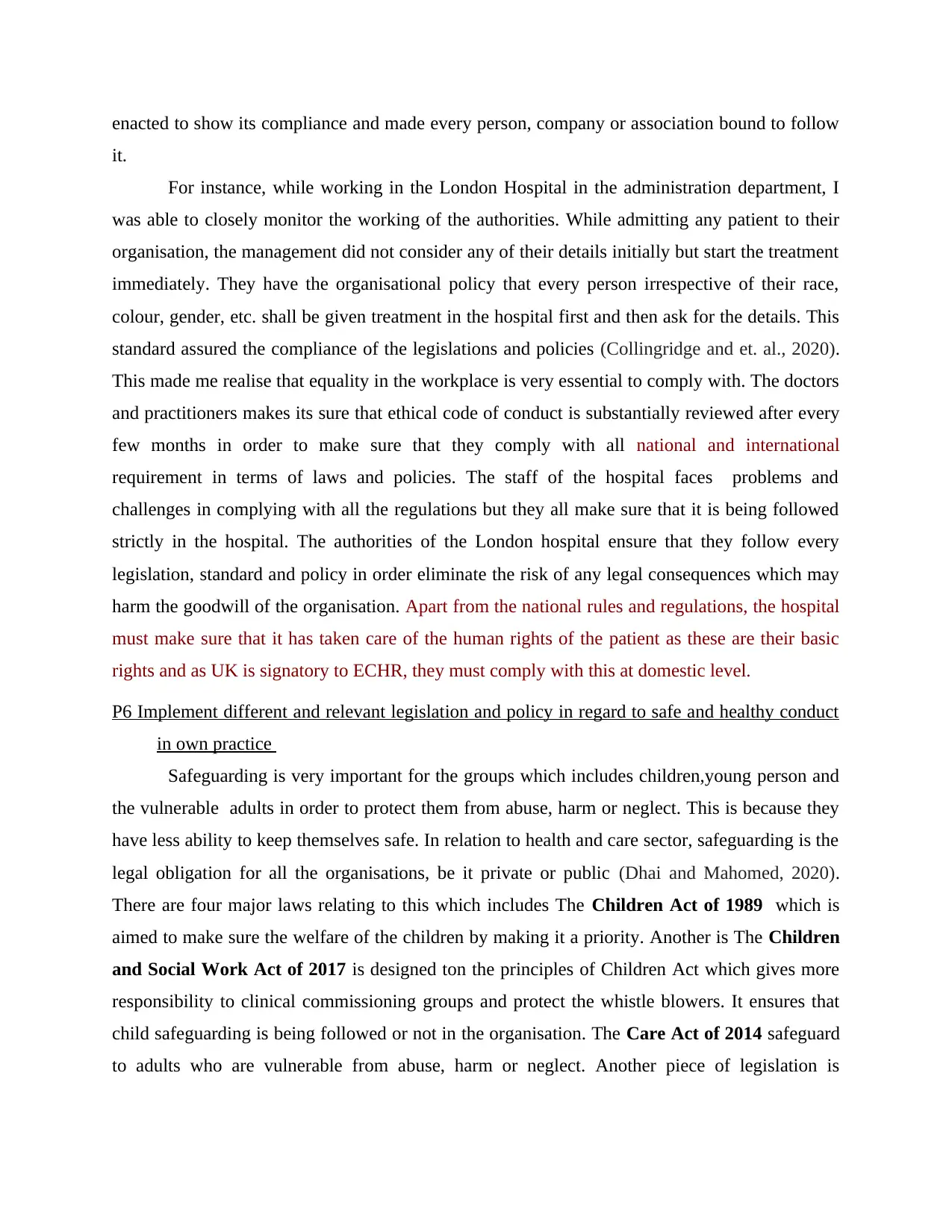
enacted to show its compliance and made every person, company or association bound to follow
it.
For instance, while working in the London Hospital in the administration department, I
was able to closely monitor the working of the authorities. While admitting any patient to their
organisation, the management did not consider any of their details initially but start the treatment
immediately. They have the organisational policy that every person irrespective of their race,
colour, gender, etc. shall be given treatment in the hospital first and then ask for the details. This
standard assured the compliance of the legislations and policies (Collingridge and et. al., 2020).
This made me realise that equality in the workplace is very essential to comply with. The doctors
and practitioners makes its sure that ethical code of conduct is substantially reviewed after every
few months in order to make sure that they comply with all national and international
requirement in terms of laws and policies. The staff of the hospital faces problems and
challenges in complying with all the regulations but they all make sure that it is being followed
strictly in the hospital. The authorities of the London hospital ensure that they follow every
legislation, standard and policy in order eliminate the risk of any legal consequences which may
harm the goodwill of the organisation. Apart from the national rules and regulations, the hospital
must make sure that it has taken care of the human rights of the patient as these are their basic
rights and as UK is signatory to ECHR, they must comply with this at domestic level.
P6 Implement different and relevant legislation and policy in regard to safe and healthy conduct
in own practice
Safeguarding is very important for the groups which includes children,young person and
the vulnerable adults in order to protect them from abuse, harm or neglect. This is because they
have less ability to keep themselves safe. In relation to health and care sector, safeguarding is the
legal obligation for all the organisations, be it private or public (Dhai and Mahomed, 2020).
There are four major laws relating to this which includes The Children Act of 1989 which is
aimed to make sure the welfare of the children by making it a priority. Another is The Children
and Social Work Act of 2017 is designed ton the principles of Children Act which gives more
responsibility to clinical commissioning groups and protect the whistle blowers. It ensures that
child safeguarding is being followed or not in the organisation. The Care Act of 2014 safeguard
to adults who are vulnerable from abuse, harm or neglect. Another piece of legislation is
it.
For instance, while working in the London Hospital in the administration department, I
was able to closely monitor the working of the authorities. While admitting any patient to their
organisation, the management did not consider any of their details initially but start the treatment
immediately. They have the organisational policy that every person irrespective of their race,
colour, gender, etc. shall be given treatment in the hospital first and then ask for the details. This
standard assured the compliance of the legislations and policies (Collingridge and et. al., 2020).
This made me realise that equality in the workplace is very essential to comply with. The doctors
and practitioners makes its sure that ethical code of conduct is substantially reviewed after every
few months in order to make sure that they comply with all national and international
requirement in terms of laws and policies. The staff of the hospital faces problems and
challenges in complying with all the regulations but they all make sure that it is being followed
strictly in the hospital. The authorities of the London hospital ensure that they follow every
legislation, standard and policy in order eliminate the risk of any legal consequences which may
harm the goodwill of the organisation. Apart from the national rules and regulations, the hospital
must make sure that it has taken care of the human rights of the patient as these are their basic
rights and as UK is signatory to ECHR, they must comply with this at domestic level.
P6 Implement different and relevant legislation and policy in regard to safe and healthy conduct
in own practice
Safeguarding is very important for the groups which includes children,young person and
the vulnerable adults in order to protect them from abuse, harm or neglect. This is because they
have less ability to keep themselves safe. In relation to health and care sector, safeguarding is the
legal obligation for all the organisations, be it private or public (Dhai and Mahomed, 2020).
There are four major laws relating to this which includes The Children Act of 1989 which is
aimed to make sure the welfare of the children by making it a priority. Another is The Children
and Social Work Act of 2017 is designed ton the principles of Children Act which gives more
responsibility to clinical commissioning groups and protect the whistle blowers. It ensures that
child safeguarding is being followed or not in the organisation. The Care Act of 2014 safeguard
to adults who are vulnerable from abuse, harm or neglect. Another piece of legislation is
⊘ This is a preview!⊘
Do you want full access?
Subscribe today to unlock all pages.

Trusted by 1+ million students worldwide
1 out of 20
Related Documents
Your All-in-One AI-Powered Toolkit for Academic Success.
+13062052269
info@desklib.com
Available 24*7 on WhatsApp / Email
![[object Object]](/_next/static/media/star-bottom.7253800d.svg)
Unlock your academic potential
Copyright © 2020–2025 A2Z Services. All Rights Reserved. Developed and managed by ZUCOL.





